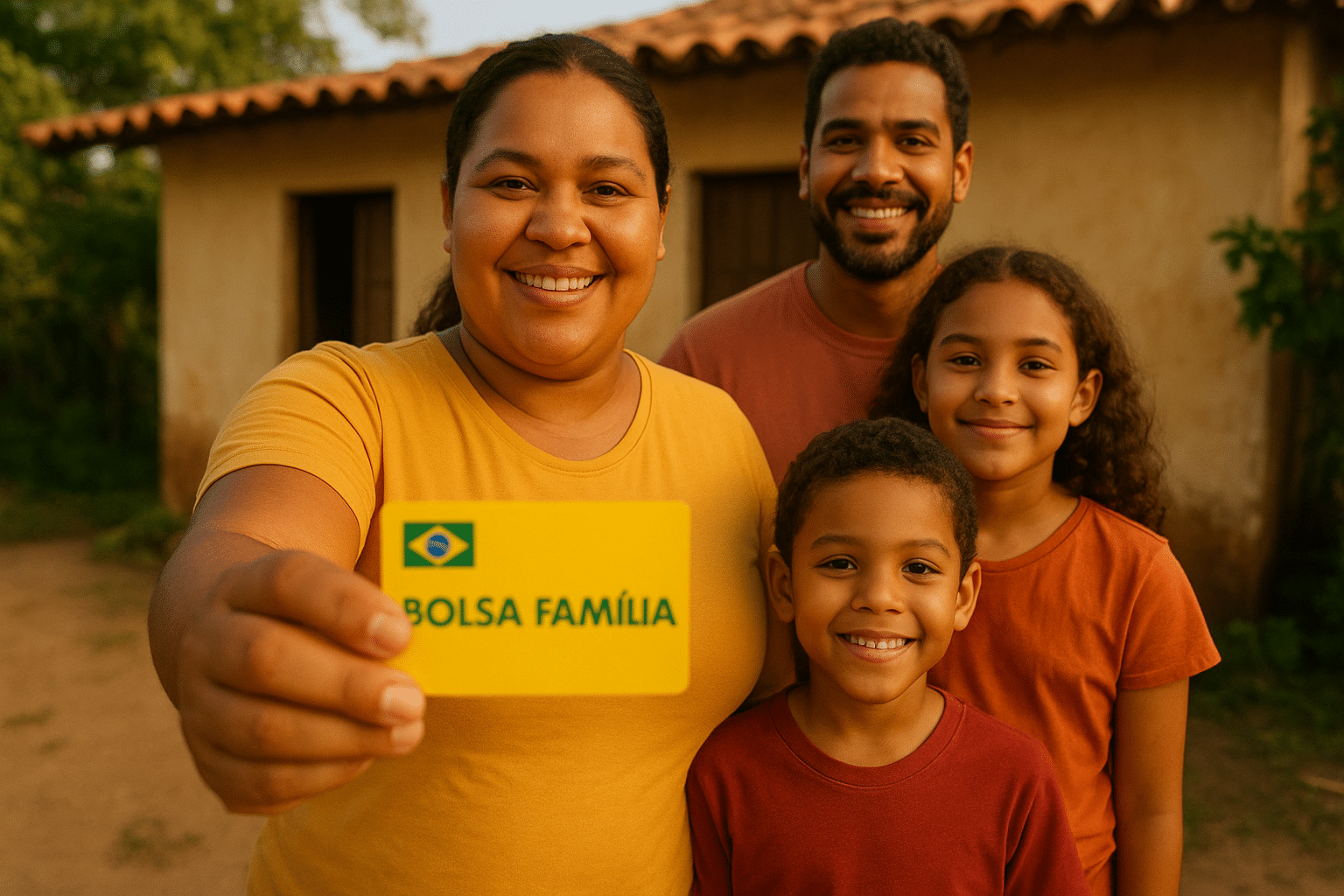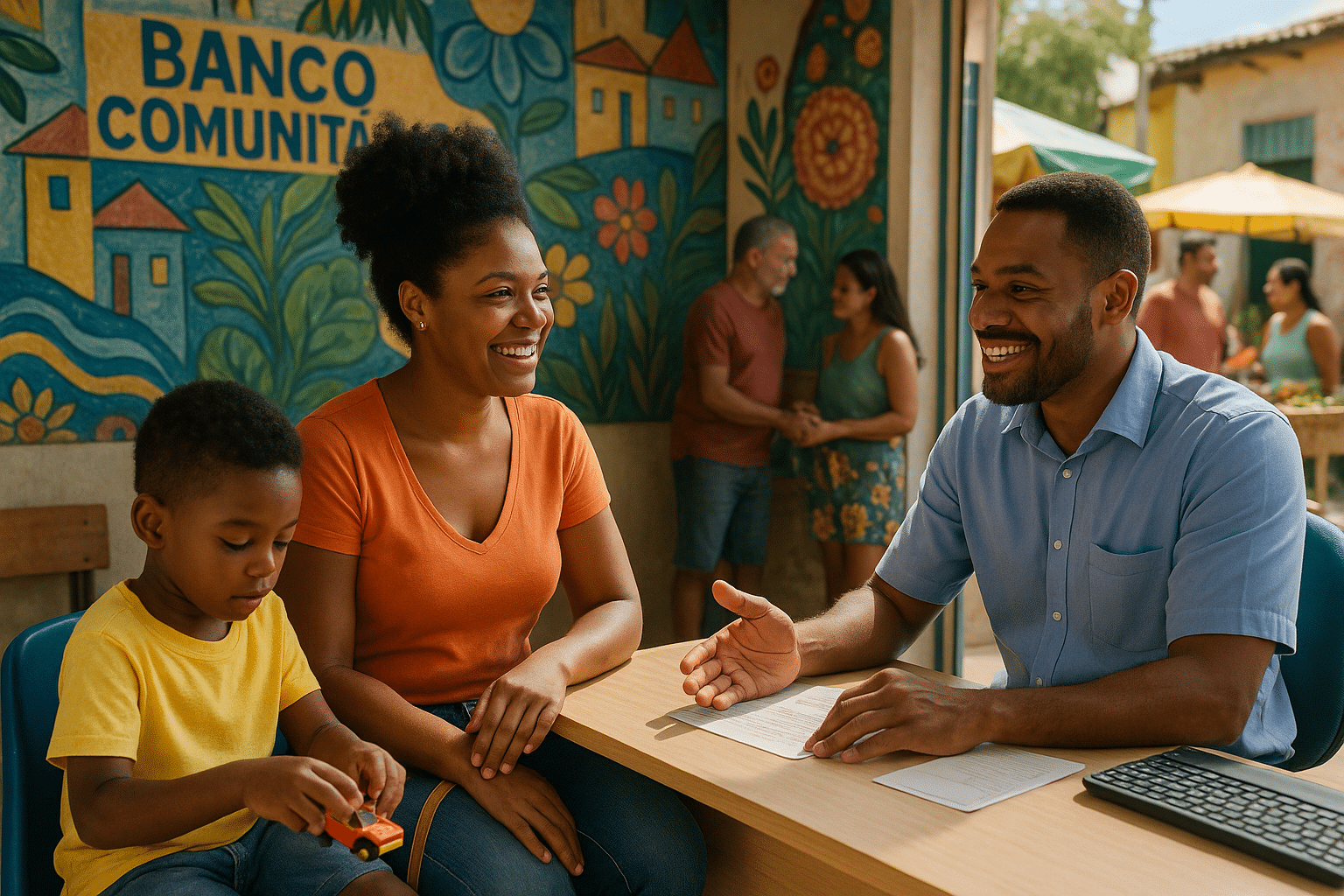Anúncios
Millions of families in Brazil rely on Bolsa Família as a lifeline, providing essential financial support for everyday needs. However, many recipients face challenges when it comes to accessing additional credit or loans to improve their quality of life. What if there was a way to leverage this benefit to unlock new opportunities? 💡
In this post, we’ll dive into how Bolsa Família recipients can access loans to create a more secure financial future. From understanding eligibility to exploring the benefits and potential risks, we’ll guide you through the process step by step. The goal is to empower families to make informed decisions and take control of their financial goals, even in challenging circumstances.
Anúncios
Discover how financial institutions are tailoring solutions specifically for low-income families, what loan options are available, and how these can impact both your immediate and long-term plans. Whether it’s starting a small business, investing in education, or covering unexpected expenses, the right financial tools can make all the difference. 🚀
Stay tuned as we explore practical tips, legal insights, and actionable advice to help Bolsa Família beneficiaries access loans responsibly while safeguarding their financial stability. Let’s pave the way to a brighter and more empowered future. 🌟
Anúncios
Empowering Communities Through Financial Inclusion
Understanding the Loan Opportunities for Bolsa Família Beneficiaries
Accessing financial services has historically been a challenge for Brazil’s lower-income communities, particularly those enrolled in government assistance programs like Bolsa Família. However, recent initiatives aim to bridge this gap by enabling beneficiaries to access microcredit and loans tailored to their needs. This strategy not only boosts financial inclusion but also empowers families to invest in education, entrepreneurship, and improved living conditions.

Unlock Your Bolsa Família Benefits
Bolsa Família recipients can now access specialized loan programs offered through banks and microfinance institutions. These programs are designed to provide low-interest rates and flexible repayment plans. The central idea is to ensure that families can borrow responsibly without jeopardizing their financial stability.
Key criteria for accessing these loans include:
- Being an active Bolsa Família beneficiary.
- Demonstrating the purpose of the loan, such as small business investments or home improvements.
- Meeting basic creditworthiness evaluations, which are simplified for low-income borrowers.
Such initiatives are a step forward in reducing financial inequalities, offering families a chance to improve their circumstances sustainably. By providing access to credit, these programs open doors to opportunities that were previously out of reach for many individuals living in poverty.
How Do These Loans Work?
Loans for Bolsa Família recipients function differently than traditional credit products. The terms and conditions are crafted to meet the unique needs of low-income households, ensuring repayment is feasible and does not lead to over-indebtedness. Here’s a breakdown of the key aspects:
- Loan Amount: Typically, these loans range from R$500 to R$5,000, depending on the family’s requirements and repayment capacity.
- Interest Rates: Interest rates are subsidized, often significantly lower than market rates. This ensures affordability for borrowers.
- Repayment Period: Borrowers are given flexible repayment terms, often ranging from 12 to 36 months.
In addition to these features, financial education workshops are often offered alongside the loan programs. These workshops teach recipients how to manage their finances, budget effectively, and utilize their loans productively. Such measures aim to reduce the risks of default and improve the long-term impact of these credit opportunities.
Building Pathways to Entrepreneurship
Microcredit as a Tool for Economic Growth
One of the most transformative aspects of loans for Bolsa Família recipients is the ability to invest in microenterprises. Many families have entrepreneurial ambitions but lack the initial capital to bring their ideas to life. Microcredit bridges this gap, enabling individuals to start or expand small businesses.
Examples of businesses funded through these loans include:
- Opening a small convenience store or food stand.
- Investing in equipment for tailoring, carpentry, or other skilled trades.
- Purchasing inventory for reselling purposes, such as clothing or household items.
Such ventures not only improve household incomes but also contribute to the local economy. When families succeed in their businesses, they generate employment opportunities within their communities, fostering broader economic growth.
Moreover, government and non-government organizations are collaborating to provide training programs. These programs equip beneficiaries with the skills they need to run their businesses effectively. By combining financial resources with education, these initiatives create a sustainable pathway for economic empowerment.
Ensuring Social and Economic Stability
Minimizing Risks and Supporting Families
While the introduction of loans for Bolsa Família recipients is a positive development, it is accompanied by challenges. One primary concern is the risk of over-indebtedness. To mitigate this, financial institutions have adopted safeguards, such as:
- Conducting thorough evaluations of the borrower’s financial situation.
- Imposing limits on the loan amounts relative to household income.
- Providing financial literacy resources to educate borrowers about responsible borrowing.
Additionally, loan repayment is structured to align with the income patterns of low-income families. For instance, repayment dates may be synchronized with the receipt of Bolsa Família payments, ensuring borrowers have the funds necessary to meet their obligations.
Another measure includes the creation of contingency plans for borrowers facing unexpected financial difficulties. In such cases, repayment terms may be renegotiated, or temporary payment suspensions may be granted. These mechanisms aim to prevent families from falling deeper into financial distress.
Impact on Household Dynamics
Access to credit has also had a profound impact on household dynamics among Bolsa Família beneficiaries. Women, who often manage family finances, are among the primary recipients of these loans. By empowering women with financial resources, these programs contribute to gender equality and strengthen the overall economic resilience of households.
Studies indicate that when women have access to financial resources, they are more likely to invest in education, health, and nutrition for their children. This creates a ripple effect, improving the quality of life for future generations and breaking the cycle of poverty.
The Role of Technology in Expanding Access
Digital Platforms for Financial Inclusion 📱
The integration of technology has been a game-changer in providing loans to Bolsa Família recipients. Digital platforms simplify the loan application process, making it more accessible for individuals in remote or underserved areas. Mobile banking apps and online portals allow beneficiaries to:
- Apply for loans without visiting a physical bank branch.
- Track loan approvals and repayment schedules in real-time.
- Access educational materials on financial management.
These technological advancements reduce barriers such as long travel distances and lack of information, which previously hindered access to credit. Furthermore, digital tools enable financial institutions to streamline their operations, lowering administrative costs and passing on the savings to borrowers through reduced interest rates.
Data-Driven Decision Making
Another key aspect of technology’s role is the use of data analytics to assess creditworthiness. By leveraging alternative data sources, such as payment histories for utility bills or mobile phone usage, financial institutions can evaluate the risk profiles of individuals who lack traditional credit histories. This approach ensures that even those without formal employment records can access credit.
As technology continues to evolve, its potential to expand financial inclusion for Bolsa Família recipients is enormous. Ongoing innovations promise to make credit products even more tailored and accessible, paving the way for greater economic participation and empowerment.
The Road Ahead: Challenges and Opportunities
Scaling the Program Nationwide
While the current initiatives have shown promising results, scaling these loan programs nationwide remains a significant challenge. Brazil’s vast geographic and economic diversity requires tailored approaches to meet the unique needs of different regions. Rural areas, in particular, face hurdles such as limited access to banking infrastructure and lower financial literacy levels.
To address these challenges, partnerships between the public and private sectors are essential. Government agencies can provide subsidies and policy support, while private institutions bring innovation and expertise in financial services. Collaborative efforts are crucial to ensuring the sustainability and scalability of these programs.
Furthermore, ongoing monitoring and evaluation are necessary to measure the impact of these initiatives. Data collection and analysis can identify areas for improvement, ensuring that the programs continue to meet the evolving needs of Bolsa Família beneficiaries.
Expanding the Scope of Financial Products
In addition to loans, there is potential to expand the range of financial products available to Bolsa Família recipients. For instance, savings accounts, insurance plans, and investment options could further enhance financial security and resilience. These products would enable families to build wealth, protect against unforeseen expenses, and plan for the future.
Ultimately, the success of these programs lies in their ability to adapt to the needs of the communities they serve. By fostering innovation, collaboration, and inclusivity, Brazil can empower its most vulnerable citizens to achieve greater economic stability and independence.

Conclusion: Empowering Futures Through Inclusive Financial Solutions
The introduction of specialized loan programs for Bolsa Família recipients in Brazil represents a transformative step toward financial inclusion and economic empowerment.
By bridging the gap between low-income families and accessible credit, these initiatives open new doors for entrepreneurship, education, and improved living conditions. This approach not only addresses immediate financial needs but also fosters long-term social and economic growth. 🌟
Through microcredit opportunities with low interest rates, flexible repayment terms, and tailored support like financial education, Bolsa Família beneficiaries can invest in their futures responsibly. These programs prioritize sustainability, ensuring that families can access credit without risking financial instability. Additionally, the integration of digital platforms simplifies the application process, making financial services more accessible to underserved populations.
One of the most impactful outcomes of these initiatives is the support they provide for women, who often play a central role in managing household finances. By empowering women, these programs contribute to greater gender equality and improved outcomes for future generations. Moreover, the promotion of microenterprise development strengthens local economies, creating jobs and fostering community resilience.
As Brazil continues to expand and refine these efforts, collaboration between public and private sectors, alongside ongoing technological advancements, will be crucial. By adapting to the diverse needs of communities, these programs have the potential to break cycles of poverty and build a more inclusive economy. Together, these efforts truly empower families to shape brighter, more sustainable futures. 💡

